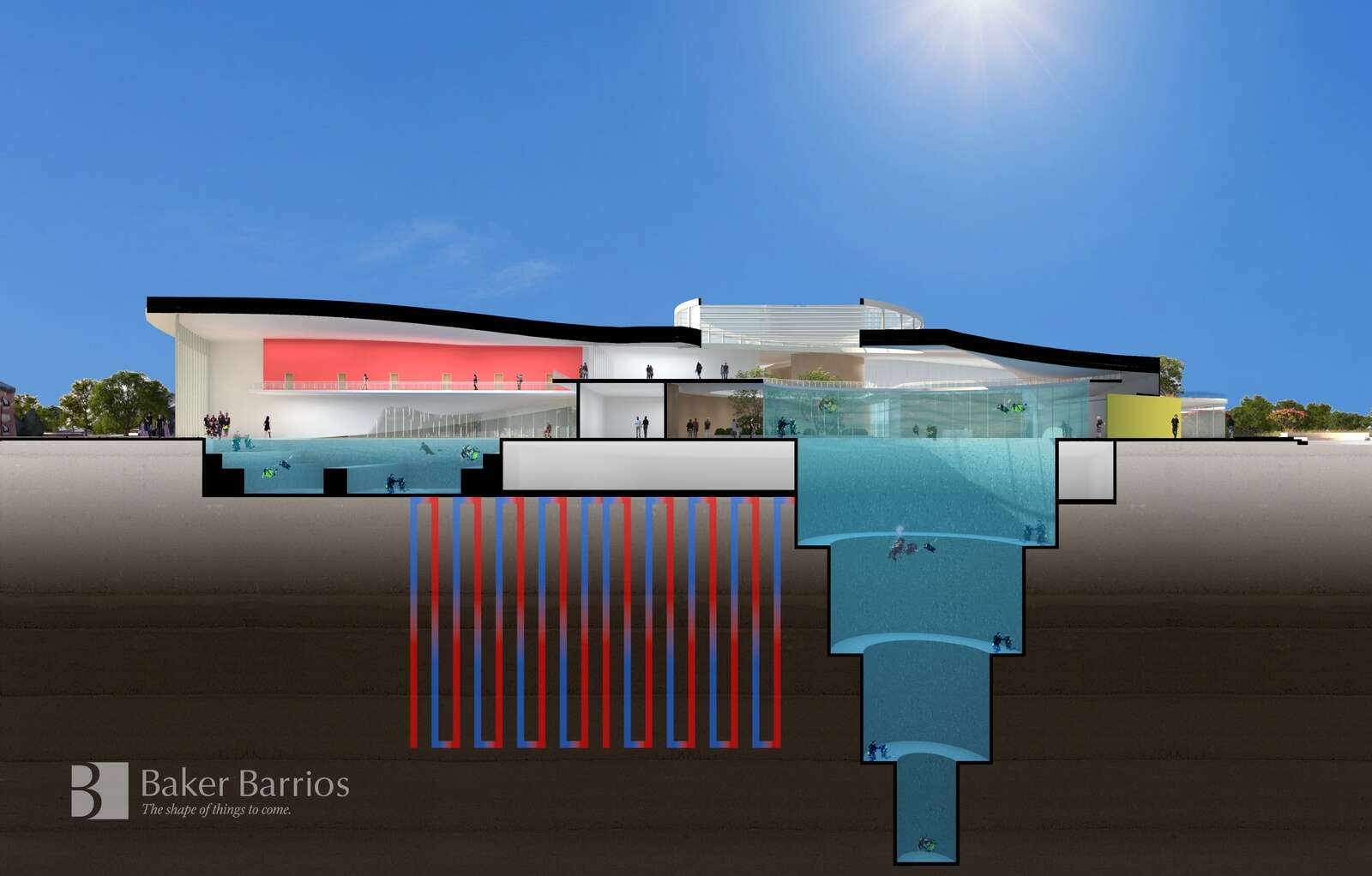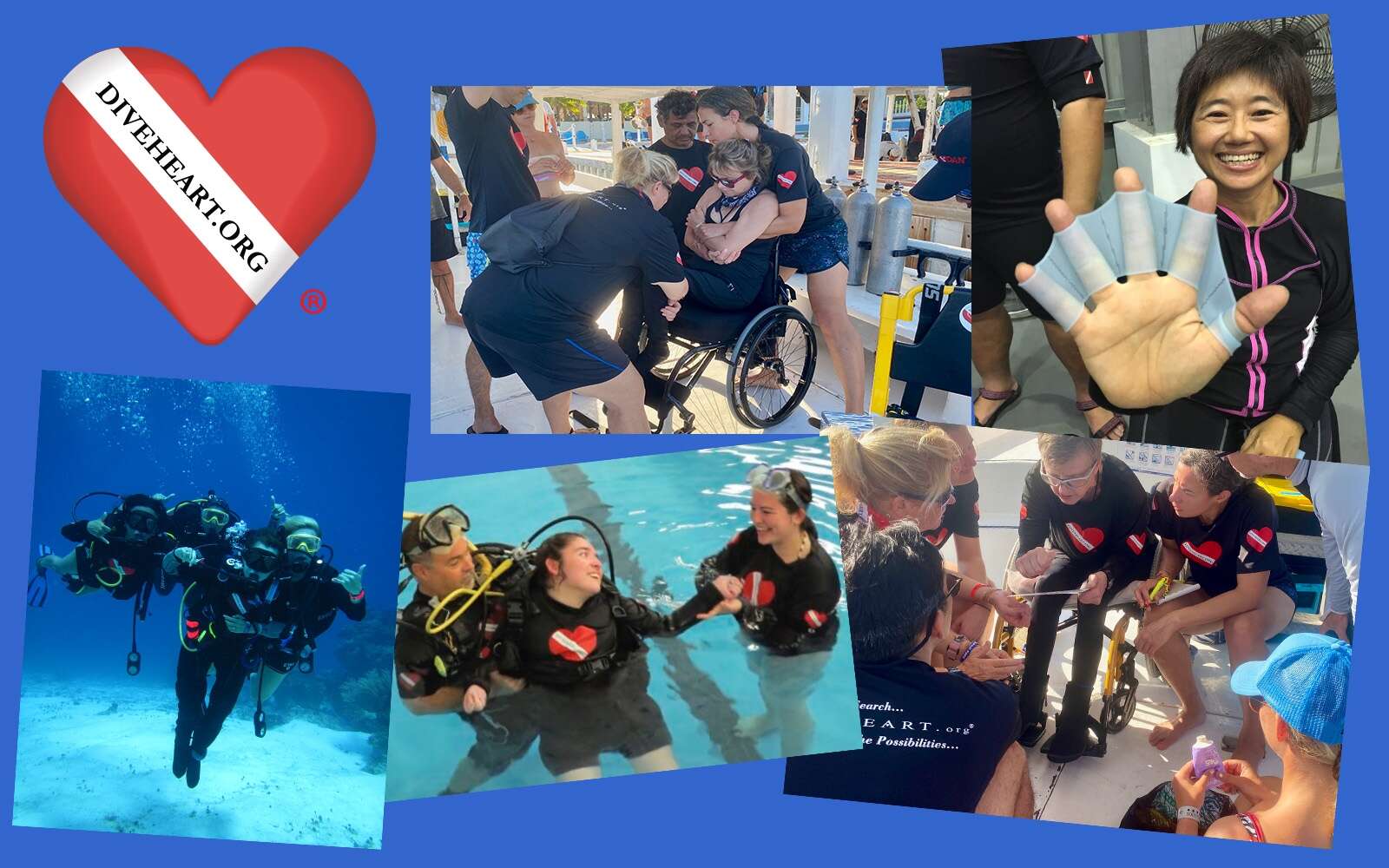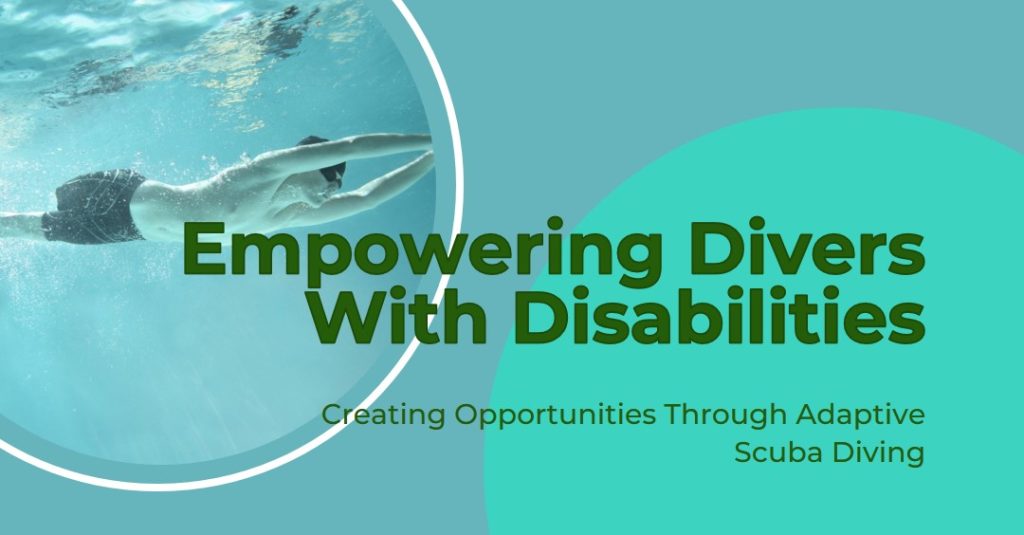Diveheart, a non-profit organization, recently submitted its $300 Million proposal to build an underwater education and research facility in North Chicago with the purpose of offering therapeutic scuba diving to people with disabilities as therapy; additionally serving as a marine biology research centre as well.
Diveheart Education and Research Facility in North Chicago will feature the world’s deepest warm water therapy pool designed specifically to assist individuals living with disabilities. Diveheart hopes to construct and endow it as part of its three-pool adaptive scuba and therapy facility with support from Lake County Partners; an ambitious undertaking which marks an important step in Diveheart’s mission.
Therapeutic Benefits of Scuba Diving
Scuba diving has long been recognized for its therapeutic advantages for individuals living with disabilities. Since 2001, Diveheart, a nonprofit organization located in Downers Grove Illinois, has offered adaptive scuba and therapy programs tailored specifically for people who suffer physical or cognitive disability.
Scuba diving provides one of the main advantages for individuals with physical disabilities – particularly those experiencing pain when standing upright – an instant sense of weightlessness that allows more freedom in moving through water than on land. Furthermore, they may enjoy experiencing greater ranges of motion through this form of aquatic therapy.
Scuba diving has many psychological advantages as an antidote for anxiety, depression and posttraumatic stress disorder (PTSD). Being underwater provides a sense of peace and relaxation while the focus required by diving can distract you from negative thoughts or emotions.
Scuba diving can also serve as a social activity that facilitates individuals living with disabilities to connect and build relationships with others, creating bonds within Diveheart programs such as group diving experiences which provide an atmosphere of support.
Funding Breakdown
Diveheart, an Illinois non-profit organization located in Downer’s Grove has proposed to construct an underwater education and research facility worth $300 Million near North Chicago. Funding allocation will take the following form:
- Construction of the world’s deepest warm water therapy pool ($100 million)
- Adaptive and therapeutic diving programs ($50 million)
- Research and development of innovative therapies ($50 million)
- Expand and influence reach ($50 million)
- Worldwide attraction for those with disabilities, scientists & others ($50 million)
Funding will be raised through donations from individuals, corporations and foundations.

Program Expansion Plans
Diveheart will use this proposed facility to expand their adaptive and therapeutic scuba programs for individuals with physical and/or cognitive disabilities, offering more training programs for instructors, dive buddies and outreach initiatives such as schools hospitals or rehabilitation centers.
This facility will also offer individuals with disabilities an environment in which to partake in water-based activities like kayaking, paddleboarding and sailing. These watersports will promote physical fitness, social interaction and overall well-being for participants.
Research and Development
Research and development will form part of Diveheart’s proposal by creating technologies and therapies designed to make life better for individuals with disabilities. Scientists and researchers can collaborate with Diveheart’s team of specialists in order to devise new treatments or therapies.
Research will focus on the many advantages of scuba therapy for individuals living with disabilities, including its effects on physical fitness, mental wellbeing and overall well-being. Results of this investigation will then be shared among various medical and scientific communities in order to promote its use as an effective form of treatment option.
Impact on the Disabled Community
The $300 million proposal for a new education and research facility is set to have a significant impact on the disabled community. Through their unique adaptive scuba and scuba therapy programs, Diveheart has been helping individuals with disabilities since 2001. The proposed facility will allow them to expand their efforts and provide even more opportunities for physical, mental, and social improvements.
Physical Health Improvements
Scuba diving is a low-impact exercise that can provide a range of physical health benefits. For individuals with disabilities, it can be particularly beneficial. The buoyancy of the water can help to reduce pressure on joints and muscles, making it easier to move around. Additionally, the resistance of the water can help to build strength and improve cardiovascular health.
The companies adaptive scuba programs are designed to cater to a range of disabilities, including physical impairments, amputations, and vision and hearing impairments. By tailoring their programs to each individual’s needs, they can help participants to improve their physical health in a safe and supportive environment.
Mental Health Enhancements
Scuba diving offers many mental health advantages. The weightlessness of water can provide a soothing sense of calm and relaxation that may especially assist those living with anxiety or posttraumatic stress disorder (PTSD). Furthermore, learning how to scuba dive can increase self-esteem and confidence levels significantly.
Scuba therapy programs aim to assist participants with improving their mental wellbeing by offering them a supportive and empowering environment. By learning scuba diving techniques, participants gain control over both themselves and their environment – something particularly helpful for individuals living with disabilities.
Strategic Partnerships and Collaborations
Diveheart has collaborated with multiple organizations and institutions in order to fulfill its mission of offering adaptive scuba and therapy programs for people living with physical or cognitive disabilities. Their partnerships have allowed Diveheart to broaden its scope, increase impact, develop innovative programs and technologies and broaden their reach and impact.
Diveheart’s Rehabilitation Institute of Chicago (RIC), who have collaborated on research projects and provided clinical support for various Diveheart programs, have proven invaluable partners, with their expertise in rehabilitation technology helping develop new approaches to scuba therapy while expanding Diveheart programs to serve more individuals.
Diveheart has collaborated with the Department of Veterans Affairs (VA) to offer scuba therapy as part of a treatment option for veterans suffering physical or mental disabilities, with funding and support for Diveheart programs through VA.
Diveheart also collaborates with various other organizations and institutions, including universities, hospitals and disability advocacy groups. Through these relationships, knowledge sharing occurs along with development of programs and technologies tailored specifically towards people living with disabilities.

Challenges and Considerations
Logistical Hurdles
The $300 million proposal for an underwater education and research facility in North Chicago is a massive undertaking. One of the biggest challenges is the logistics of building such a facility. It requires extensive planning and coordination to ensure that all aspects of the project are completed on time and within budget. This includes everything from securing funding to hiring contractors and overseeing construction.
Environmental Concerns
Another challenge facing the Diveheart project is its impact on the environment. Constructing such an enormous underwater facility could cause substantial harm to its surrounding ecosystem; to minimise its effect, all necessary precautions must be taken, including consulting environmental specialists when formulating construction plans that cause minimal disturbance of said ecosystem.
Sustainability Measures
Sustainability is another essential consideration of the Diveheart project. Operating this facility requires considerable energy consumption, so ensuring its production in an eco-friendly and renewable manner should be prioritized – using renewable sources like solar or wind power as well as efficient construction practices can all play an integral part of ensuring long-term viability and operation of this facility.
Overall, the Diveheart project presents numerous logistical, environmental, and sustainability hurdles; but with careful planning and execution it should be possible to overcome them and build an outstanding underwater education and research facility which will benefit individuals living with physical or cognitive disabilities for years to come.
Public and Community Outreach
Diveheart’s mission is to offer educational scuba diving programs open to children, adults and veterans with disabilities so as to offer both physical and psychological therapeutic value to its participants.
This non-for-profit has been actively engaging in events and activities to raise awareness of the benefits of scuba diving for those with disabilities, hosting dive-a-thons, clinics and adaptive scuba training courses to further its cause and gain new participants.
Diveheart frequently partners with other organizations in order to expand its reach and impact; such as its partnership with Rehabilitation Institute of Chicago in developing an innovative program combining scuba diving with physical therapy intended to help spinal cord injury patients regain mobility and improve quality of life; this has proven highly successful.
How to Support Diveheart
Diveheart is a nonprofit organization that relies on the generosity of passionate, hardworking volunteers and donors to continue its mission of providing unique adaptive scuba and scuba therapy programs to individuals with physical and/or cognitive disabilities.
Here are some ways to support Diveheart:
Volunteer
Volunteers are always needed for our non-for-profit, from teaching scuba diving lessons to individuals with disabilities to helping out at fundraising events. Volunteering at SCUBA Canada is an incredible way for anyone with a passion for scuba diving to make a positive change in people’s lives – so please reach out if this opportunity excites you!
Donate
Diveheart is a 501(c)(3) nonprofit organization, which means that all donations are tax-deductible. Donations can be made online through the Diveheart website, and there are a variety of ways to give, including one-time donations, monthly donations, and legacy gifts. Every dollar donated to Diveheart goes directly to supporting its programs and services.
Attend an Event
Diveheart organizes several exciting events throughout the year, such as diving trips, fundraising galas and community outreach initiatives. Participation is an ideal way of showing support while enjoying yourself! Be sure to visit their website for updates of forthcoming events.
Spread the Word
One simple way you can help Diveheart is to spread awareness about their mission and programs. Post updates about Diveheart on social media platforms such as Twitter or Facebook; tell friends and family members about it; encourage more individuals to get involved – the more people who learn about Diveheart means greater support will flow its way!
SOURCE: Pressez [Link]


